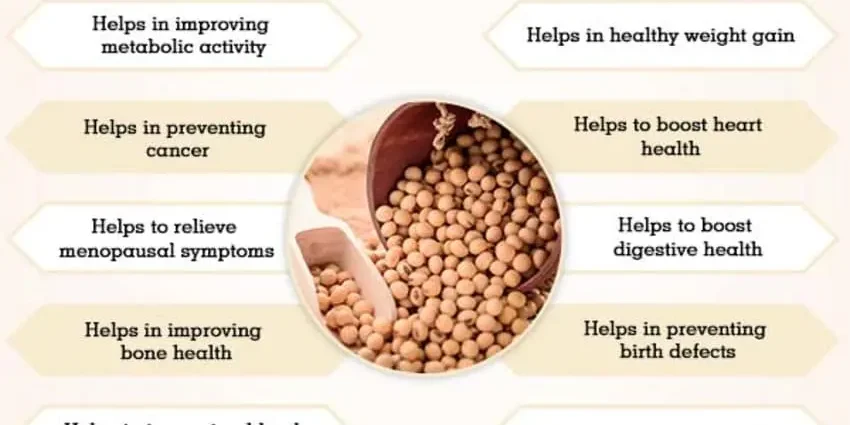Soy benefits
1. Soybean seeds are rich in protein – the basis of all living matter on earth. If the ideal protein is presented in the form of 100 units, then the protein of cow’s milk is 71 units, soybean – 69 (!).
2. Soy contains polyunsaturated fatty acids that the body needs to maintain life.
3. Soybean oil contains phospholipids that help cleanse the liver, have antioxidant effects, and are beneficial for diabetes.
4. Tocopherols in soy are biologically active substances that can increase the body’s immunity, and are especially useful for men to restore potency.
5. Soy is a storehouse of vitamins, micro- and macroelements, it contains β-carotene, vitamins E, B6, PP, B1, B2, B3, potassium, phosphorus, calcium, magnesium, sulfur, silicon, sodium, as well as iron, manganese, boron , iodine …
6. Eating soy can lower the level of bad cholesterol in the body.
7. When replacing red meat with soy products, an improvement in the functioning of the heart and blood vessels is observed.
8. Soy is recommended for all dieters, as are other legumes that provide the body with a long feeling of fullness.
Soybean harm
Today soybeans are extremely popular, the highest demand for it is among vegetarians, athletes and those who are losing weight. It is added to many products, which ultimately damaged the reputation of the product: manufacturers got carried away by adding soy to meat products, and then, in the wake of increasing demand, they began to experiment with genetic modification of soy. This caused a backlash among consumers and led to massive anti-soy propaganda. But is everything so simple?
1. It is believed that soy-based infant formula can cause premature puberty in girls and behavioral disorders in boys, which can subsequently lead to physical and mental disorders. The statement is extremely ambiguous, since in Japan, soy is very popular, it is eaten at any age and, by the way, it is a nation of long-livers. In addition, for example, soybean oil contains lecithin, which is an essential building block of the peripheral and central nervous system, which means it is useful for a growing body. The skepticism about soy is largely rooted in the ingrained link between soy and GMOs. However, for example, soybean oil used in baby food is preliminarily very thoroughly purified and filtered during production.
2. In 1997, research showed that soy is bad for the thyroid gland. Soy contains a certain amount of strumogenic substances that interfere with the normal functioning of the thyroid gland. That is, if you have a significant lack of iodine in your diet, then this may be a reason to stop excessive (!) Consumption of soy (normal consumption is 2-4 servings (1 serving – 80 g) of soy per week). Iodine deficiency must be replenished with iodized salt, seaweed and / or vitamin supplements.
3. Soy can cause allergies, just like many other foods.
4. Research has shown a relationship between soy consumption and mental performance: soy foods increase the risk of Alzheimer’s. The isoflavones contained in soy are evaluated by scientists in different ways, some say that they help to strengthen mental abilities, while others – that they compete with natural estrogens for receptors in brain cells, which ultimately can lead to disruption of its work. In the area of close attention of scientists – tofu, tk. a number of studies have shown that its constant use by subjects leads to a loss of brain weight, namely, to shrinkage.
5. Soy foods can accelerate the aging process of the body. Scientists from the Russian Academy of Sciences conducted an experiment on hamsters that were regularly fed with soy products. As the results of the study showed, such animals aged faster than the rodents of the control group. Soy protein is to blame, scientists say. However, the same substance is used in cosmetics, in particular in skin creams: according to manufacturers, it improves metabolic processes, stimulates the activity of skin cells and prevents the formation of wrinkles. Also, a curious fact, soy contains tocopherols – vitamins of the E group, which slow down the aging process.
Returning to the studies of the Russian Academy of Sciences, it must be said that scientists recommend reducing the dangerous properties of soybeans by its long fermentation. This is called fermented soybeans.
Such an ambiguous interpretation of the properties of soybeans can be explained by the fact that the research can be based on a product of different quality levels. Natural soybeans are more difficult to cultivate, moreover, their yield is low. This forces many producers to turn to the cultivation of genetically modified products.
Scientists agree on one thing for sure: soy should be consumed in moderation and carefully approaching its choice: give preference only to high-quality and proven food.










